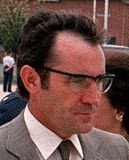Portuguese presidential election, 1976
|
|
||||||||||||||||
|---|---|---|---|---|---|---|---|---|---|---|---|---|---|---|---|---|
|
||||||||||||||||
| Turnout | 75,47% | |||||||||||||||
|
||||||||||||||||
|
||||||||||||||||
| Portugal |
 This article is part of the series: |
Francisco da Costa Gomes
Independent
António Ramalho Eanes
Independent
This article is part of the series:
Politics and government of
Portugal
The Portuguese presidential election of 1976 was held on 27 June.
With a broad base of support that comprised the center-left and the center-right, Ramalho Eanes won the election on the first round and became the first elected President of Portugal after the Carnation Revolution.
The Portuguese Communist Party presented its own candidate, Octávio Pato, a well known anti-fascist. One of the major responsibles for the military operations during the Carnation Revolution, in 1974, Otelo Saraiva de Carvalho, was also a candidate.
Any Portuguese citizen over 35 years old has the opportunity to run for president. In order to do so it is necessary to gather between 7500 and 15000 signatures and submit them to the Portuguese Constitutional Court.
According to the Portuguese Constitution, to be elected, a candidate needs a majority of votes. If no candidate gets this majority there will take place a second round between the two most voted candidates.
There was also one candidate rejected by the Portuguese Constitutional Court for not complying with the legal requirements:
...
Wikipedia


